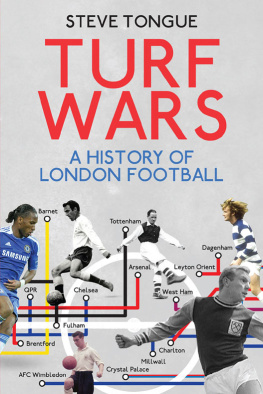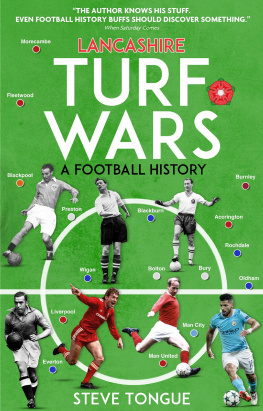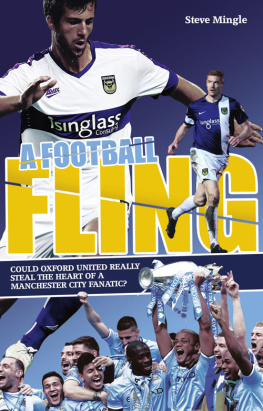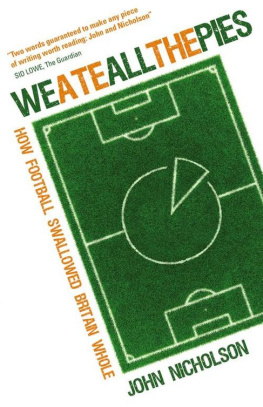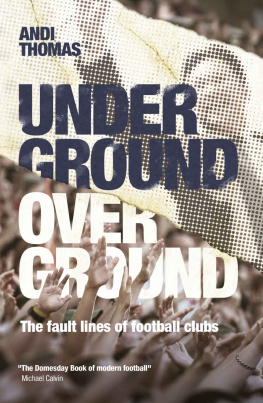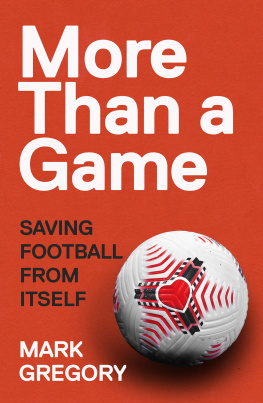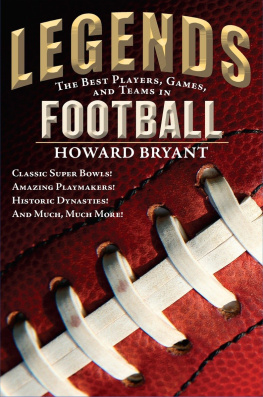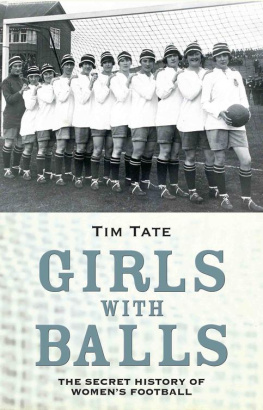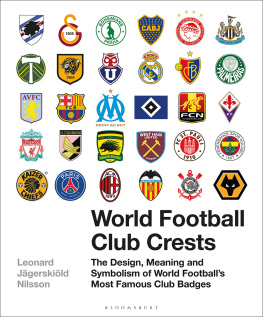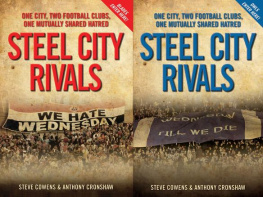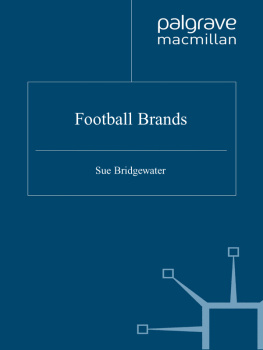First published by Pitch Publishing, 2016
Pitch Publishing
A2 Yeoman Gate
Yeoman Way
Durrington
BN13 3QZ
www.pitchpublishing.co.uk
Steve Tongue, 2016
All rights reserved under International and Pan-American Copyright Conventions. By payment of the required fees, you have been granted the non-exclusive, non-transferable right to access and read the text of this e-book on-screen. No part of this text may be reproduced, transmitted, downloaded, decompiled, reverse-engineered, or stored in or introduced into any information storage and retrieval system, in any form or by any means, whether electronic or mechanical, now known or hereinafter invented, without the express written permission of the Publisher.
A CIP catalogue record is available for this book from the British Library
Print ISBN 978-1-78531-191-8
eBook ISBN 978-1-78531-248-9
--
Ebook Conversion by www.eBookPartnership.com
Contents
FA founded in 1863 after Blackheath lead the breakaway from football to rugby, crying hacking is the true football game; Wanderers, originally based at Snaresbrook, win first FA Cup at Kennington Oval; Football League begins in 1888 after professionalism is legalised, with no southern clubs until Woolwich Arsenal join Division Two five years later; early days of Millwall, Tottenham Hotspur, West Ham, Fulham, Brentford, QPR, Orient, Barnet and Wimbledon, under various names.
Tottenham win 1901 FA Cup as non-league team; Arsenal win promotion; Chelsea and Clapton Orient join expanded Second Division, followed by Fulham and Spurs; London stages first official Olympics in 1908; ambitious Fulham director Henry Norris proposes merging or ground-sharing with Woolwich Arsenal, then takes over Arsenal and moves them north of river despite objections from Orient and Spurs; North London rivalry takes bitter turn post-war as Norris persuades Football League officials that Arsenal should replace Spurs in top division; huge expansion of league with 22 new clubs, including Brentford, Millwall, Palace, QPR, joined by Charlton.
London clubs at last making an impact; Spurs are Cup winners and Division One runners-up; Arsenal dominate the early 30s with David Jack and Alex James after Herbert Chapman joins as manager from Huddersfield and Henry Norris is banned for life; West Ham in the chaotic first Wembley cup final; Charlton go from Division Three to Division One runners-up in three seasons under Jimmy Seed after Fulham almost beat them to it; Brentfords best-ever period in top six, eclipsing Chelsea; QPR and Palace are stuck in Division Three but Millwall escape; Thames FC come and go in two seasons; Orient just survive.
War-time football with guest players; London League and London War Cup; 60,000 watch Arsenal in Wembley cup final despite Blitz; volunteers and casualties from clubs as in WWI.
A return to normality and huge upsurge of interest and attendances; Charlton reach successive FA Cup finals but only Arsenal and Chelsea are with them in the top-flight until Spurs return and win the 1951 title at first attempt by pushing and running; Chelseas first-ever title (1955) and European jaunt before West Ham and Johnny Hayness Fulham join the top division; Palace and Millwall stuck in the new Division Four
A new era as the maximum wage is abolished and Haynes becomes the first 100-week English footballer; Spurs become first club this century to complete league and cup double; European football grabs the imagination and brings trophies to swinging London; Moore, Hurst and Peters (plus Cohen) win the World Cup; even Leyton Orient make the top division while QPR win League Cup at Wembley; but hooliganism on the rise with London clubs to the fore.
Thriving non-league scene in London from the start despite competition from a dozen professional clubs; from Casuals in the first Amateur Cup Final (1894), London supplies almost 20 different winners; leading amateurs appear as late as 1955 in Chelseas title-winning team; 100,000 watch Amateur Cup finals at Wembley featuring teams such as local rivals Walthamstow Avenue and Leyton, Barnet and Enfield; after the FA abolish amateurism in 1974, Barnet and Wimbledon go on to achieve Football League status while mergers eventually propel Dagenham & Redbridge to the same level.
The mighty are fallen as old guard of managers depart (Greenwood, Nicholson, Sexton, Mee); Arsenal emulate Tottenhams double but Spurs, Chelsea, West Ham all relegated before Spurs revive as foreign influx begins; QPR peak; Palace make the top division; the 80s become a dire decade for football as crowds plummet everywhere; success in south London as Charlton, Millwall, Palace and Wimbledon all reach Division One; QPR try to merge with Fulham while Charlton have to leave home; eight London clubs in the top division before football changes forever
The Premier League, pay-per-view television and all-seater eras begin, dominated just like the original Football League by the North and Midlands; five seasons until a London side even makes the top three, then Arsene Wenger, one of the first foreign managers, makes Arsenal a force again; Chelsea, under the controversial Ken Bates, rebuild Stamford Bridge and their fortunes; after Crystal Palaces greatest season, Barnet, founded in 1888, reach the league 103 years later; Wimbledon finish in the top six then begin a long slide; new ground for Millwall but Charlton get back to The Valley and reach the Premier League; Fulham flourish under colourful foreign ownership, overtaking QPR.
Arsenals run as top London club for nine seasons in a row is ended as Abramovich buys Chelsea and hires Mourinho; but it is under Roberto di Matteo that they become Londons first European Cup winners after 56 years; Arsenal move grounds but struggle to win trophies; London stages Olympics again and Spurs and West Ham vie for the stadium; Barnet and Brentford plan new homes too; Dagenham & Redbridge reach the league, briefly, but Wimbledon disappear to Milton Keynes and are then reborn in Kingston; Arsenal, Chelsea and Tottenham the biggest three in the capital just like 100 years ago.
Acknowledgements
M ANY thanks to all who helped with numerous queries over the past months, especially those with impressively detailed knowledge of a particular club like Iain Cook (Arsenal), John Fennelly (Tottenham), Rick Glanvill (Chelsea) and the Moore, Hurst and Peters of West Ham United, Steve Marsh, John Northcutt and John Powles.
Also to David Barber, Dr Graham Curry, Norman Giller, Peter Goringe, Ian Nannestad of Soccer History magazine, Keir Radnedge, Andrew Riddoch, Phil Shaw, Dave Simpson and Nick Szczepanik. To Duncan Olner for the front cover and, above all, Paul and Jane Camillin and Derek Hammond at Pitch Publishing for making it all possible.
Introduction
F EW cities in the world have as many professional football clubs as London and it is fair to say that none have the history or variety of clubs and characters explored in these pages; from Wanderers to AFC Wimbledon; from Charles Alcock and Lord Kinnaird, through Herbert Chapman and Bill Nicholson to Jimmy Greaves and Bobby Moore, Mohamed Al-Fayed and Roman Abramovich.
The Football Association the first of its kind anywhere and with it the FA Cup were founded in the capital, and Wanderers, originally based at Snaresbrook, dominated the competitions early years.

